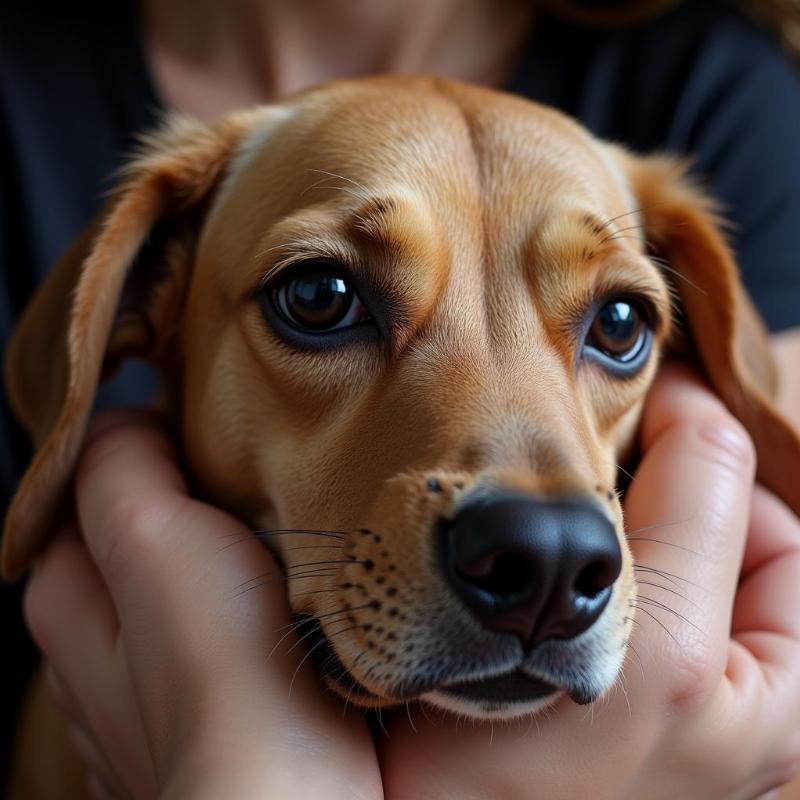Understanding why your dog growls when hugged is crucial for a happy and safe relationship. While we often associate hugs with affection, your canine companion might not interpret this gesture in the same way. In fact, a growl when hugged can be a clear sign of discomfort, stress, or even fear. Let’s explore the reasons behind this behavior and how to better understand your dog’s body language.
Dogs communicate primarily through body language, and growling is one of their ways of expressing their feelings. It’s a vital warning sign that shouldn’t be ignored. Dismissing it could lead to escalated behavior like snapping or biting. Instead, see it as an opportunity to learn more about your dog’s comfort levels and adjust your interactions accordingly. Is your dog feeling trapped or overwhelmed? Are there underlying medical reasons contributing to their discomfort? We’ll delve into these questions and more to help you decipher your furry friend’s signals.
Decoding Canine Body Language: More Than Just a Growl
A growl isn’t the only indicator of your dog’s unease. Other subtle signs might accompany or even precede the growl, such as lip licking, yawning, whale eye (showing the whites of their eyes), flattened ears, or a tucked tail. Recognizing these subtle cues can help you avoid a situation where your dog feels the need to growl. Remember, prevention is key. By learning to read your dog’s body language, you can create a more positive and less stressful environment for both of you.
The Hug: A Human Gesture, Not a Canine One
In human culture, hugs represent affection and comfort. However, in the canine world, a hug can be perceived as a restrictive and dominant gesture. Dogs don’t naturally hug each other. Imagine being embraced by someone much larger than you, restricting your movement – that’s how a hug can feel to a dog. This feeling of being trapped can trigger anxiety and fear, leading to a growl as a warning signal. Understanding this difference in perspective is crucial to building a respectful relationship with your dog.
Medical Reasons for Growling While Being Hugged
Sometimes, a dog’s aversion to hugs can be related to an underlying medical condition. Pain or discomfort can make them more sensitive to touch, and a hug can exacerbate their discomfort. If your dog suddenly starts growling when hugged, especially if this behavior is new, it’s important to consult with your veterinarian. They can rule out any medical reasons and provide guidance on how to manage your dog’s pain and anxiety.
 Dog Showing Discomfort During a Hug
Dog Showing Discomfort During a Hug
Alternatives to Hugging: Showing Affection the Canine Way
So, how can you show your dog affection without making them uncomfortable? Dogs appreciate gentle petting, soft scratches behind the ears, or a good belly rub (if they enjoy it). Respecting their personal space and letting them approach you for affection is key. Playing games, going for walks, and simply spending quality time together are all great ways to bond with your dog and strengthen your relationship.
Respecting Your Dog’s Boundaries: A Path to a Stronger Bond
Respecting your dog’s boundaries is essential for a harmonious relationship. If your dog growls when hugged, it’s a clear sign they’re uncomfortable. Don’t force the interaction. Instead, focus on building trust and understanding through positive reinforcement and respectful communication. By learning to interpret their body language and respecting their individual preferences, you can deepen your bond and create a happy and fulfilling relationship with your furry friend.
Conclusion: Listen to Your Dog’s Growl
When your dog growls during a hug, it’s not being aggressive; it’s communicating. It’s telling you that it’s uncomfortable and needs space. Respecting this signal and adjusting your interactions will not only strengthen your bond but also contribute to a safer and more positive environment for both of you. Understanding why your dog growls when you hug him is essential for a healthy and happy relationship built on mutual trust and respect.
FAQ:
- Why does my dog growl at me when I hug other people? This could be due to resource guarding (of you) or general anxiety about the change in dynamics.
- Is it ever okay to hug a dog? Some dogs tolerate hugs, especially from trusted family members, but it’s always best to err on the side of caution and observe their body language.
- How can I train my dog to accept hugs? It’s not recommended to force a dog to accept hugs. Focus on building trust and positive associations with touch through gentle petting and positive reinforcement.
- My dog never used to growl when hugged, but now he does. Why? This could be due to a change in the dog’s environment, a medical condition, or a past negative experience. Consult your veterinarian.
- What should I do if my dog growls at me? Stop the interaction immediately. Give your dog space and avoid repeating the action that caused the growl.
Related Articles:
(No related articles provided to link)
Beautdogs.us is your premier destination for all things dog-related in the United States. We offer expert advice on dog breeds, care, and products, catering to both seasoned and new dog owners. As a trusted resource for comprehensive and engaging dog care information, Beautdogs.us helps you navigate the world of canine companionship with confidence. Contact us today to learn more! Email: [email protected], Phone: +1 501-555-7529.